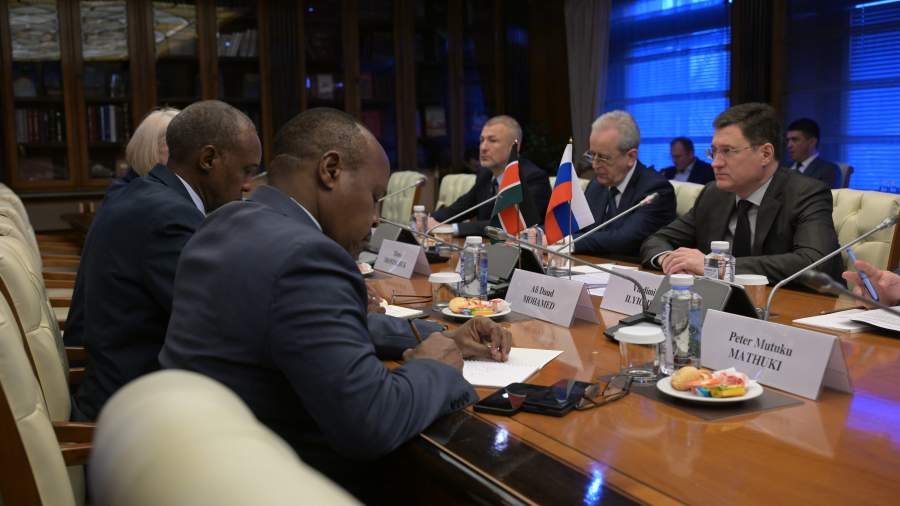Russia and Africa to start working together on climate agenda

On Wednesday, February 19, Russian Deputy Prime Minister Alexander Novak held a meeting with Ali Mohamed, Chairman of the African Group of Negotiators of the UN Framework Convention on Climate Change, Special Representative of the President of Kenya on Climate, and Andrei Melnichenko, Chairman of the Russian Union of Industrialists and Entrepreneurs for Climate Policy and Carbon Regulation. The topic of the conversation was Russia's and Africa's climate approaches.
"The transition to a low greenhouse gas emission economy should be fair and take into account different national climatic and natural features and development priorities. I believe that the transition to zero emissions will be gradual, using a wide range of technologies. There is a need for harmonious coexistence of both green and conventional energy, which can mutually complement each other," Alexander Novak emphasized.
In recent years, the country has formed a system of reporting on greenhouse gas emissions, launched a national carbon market, and is implementing an experiment to achieve carbon neutrality in the Sakhalin region. Today Russia is the world leader in terms of net greenhouse gas emission reduction since 1990. It is planned to achieve carbon neutrality no later than 2060.
The parties also agreed that developed countries should not shift the burden of responsibility to developing countries in the fight against climate change. For example, Ali Mohamed, Special Representative of the President of Kenya on Climate, said that African countries, like Russia, aim to contribute to the fight against climate change. However, he said the current approaches to the climate agenda are unfair.
"Developing countries are under pressure to increase the ambition of climate targets and refrain from using abundant natural resources and fossil fuels, but these countries receive almost nothing in return," Ali Mohamed emphasized, adding that the historical contribution of African countries is about 3% of all accumulated anthropogenic emissions.
Against this background, the representative of the African continent expressed high interest in the Russian climate strategy and monitoring. According to Ali Mohamed, it is necessary to "work out the possibility of applying the developments of the Russian climate monitoring system at the pan-African level to obtain reliable and credible data on emissions and absorption of greenhouse gases". Such a project could become one of the flagship areas of cooperation with Russia in the scientific sphere, as well as in the field of climate policy, he said.
For his part, Andrey Melnichenko spoke about the participation of the Russian Union of Industrialists and Entrepreneurs (RUIE) in the formation of national climate policy, as well as about the work of RUIE experts in international climate negotiations. He drew attention to the fact that Russia and Africa have similar interests in the climate agenda, as they promote the principle of equity in the global climate dialog.
"Countries with lower accumulated net emissions should not pay countries with higher net emissions, simply put - the 'clean' should not pay the 'dirty'. In our opinion, this logic should be the basis of the entire global climate architecture," said Mr. Melnichenko.
In addition, he drew attention to the special importance of developing climate diplomacy in the era of crisis of current approaches to the climate agenda. It is no less important to build practical cooperation and jointly promote fairer and more effective approaches to global climate policy, the RUIE Committee Chairman emphasized.
"Given the proximity of Russia's and Africa's positions in the climate agenda, it makes sense to define specific goals and a clear plan for further joint work in this direction," concluded Andrey Melnichenko.
Following the meeting, the parties agreed to prepare a joint work plan for the development of cooperation between Russia and Africa in the field of climate agenda with the involvement of interested representatives of the business community. The Russian Union of Industrialists and Entrepreneurs (RUIE) was proposed to coordinate this work from the Russian side.
Last November, the 29th UN Climate Change Conference (COP29) was held in Azerbaijan. The majority of participants supported the new collective quantitative goal (NCQG) of allocating $300 billion annually by developed countries to developing countries for the global fight against climate change. However, according to a UN press release, developing countries had requested more than $1 trillion in aid, and they found the adopted agreement insulting. Developing countries were also disappointed that the text of the document did not build on last year's agreement calling for a divestment from fossil fuels.
Переведено сервисом «Яндекс Переводчик»
